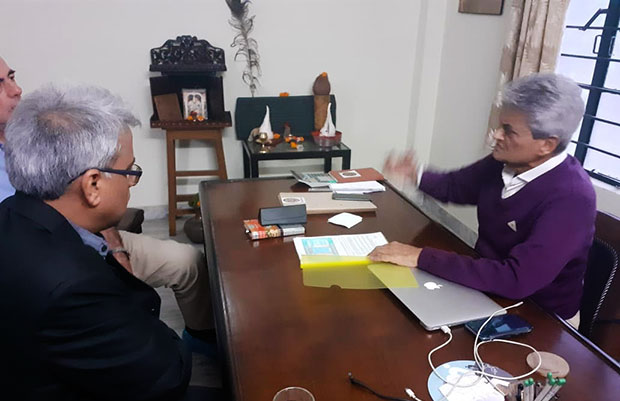
Taking a Stand Against Human Trafficking
In India’s remote Himalayan foothills, where educational and economic opportunities are scarce, youth are particularly vulnerable to migration, labor exploitation and human trafficking. An innovative new partnership between Salesian College Sonada and the Rimpocha tea company promises to address these challenges in a mutually beneficial way.
Salesian College Sonada is located in the village of Gorabari, not far from Darjeeling—the world-renowned producer of quality teas. Approximately 87 estates operate in Darjeeling today, which together employ around 52,000 workers. Despite this, wages are low, poverty and hunger exist, and complex external pressures mean that more and more producers are scaling back or completely shutting down their operations. This disproportionately affects girls and young women, who comprise the majority of the Darjeeling tea industry’s workforce. And that’s when the traffickers take advantage.
According to local organizations working to address the issue, more than 400 vulnerable girls and young women are trafficked from Darjeeling’s tea gardens each year. Dazzled by the promises of education, higher pay and brighter futures elsewhere—promises that never actually materialize—they make easy prey for unscrupulous adults seeking to lure them away from home and family.
“This kind of exploitation only happens where education and employment are not easily available,” says Father Gus Baek, director of Salesian Missions. “That’s why Salesian missionaries in this area—and around the globe—strive to empower young women and girls through training opportunities that lead to jobs with decent wages.”
First established in 1933, Salesian College Sonada currently educates 1,400 undergraduate students. In addition to traditional liberal arts programs, the college also offers programs that prepare students for in-demand jobs in their region, including tourism and travel management.
Recently, Mr. Rajah Banerjee of Rimpocha approached Father C.M. Paul, campus minister at the college, with a proposal: he would donate 40 percent of his online sales for an entire month in order to establish new training opportunities for girls and young women who have lost their employment at other tea plantations. The fit is natural and according to Banerjee, the Rimpocha brand “is not just tea, but a philosophy of life which stands on five pillars of sustainability: healthy soil, economically empowered women, biodynamic compost and fuel, fair pricing and trade for marginalized growers, and technological assistance for direct marketing of their product.”
This philosophy has proven to work. Amid unsustainable practices and resulting closures at other plantations, Rimpocha remains strong.
“Education with skills training is the only solution to prevent girls from being trafficked,” says Fr. Gus. “Hopefully, this new partnership will go a long way toward providing them with new and stable employment opportunities.”
Our mission develops partnerships that protect and empower vulnerable girls and young women. What’s your mission?
Learn more about our work in India.

